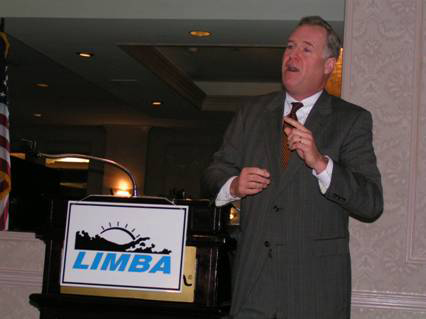Fitzpatrick Takes on Political Class with Historic Pension Reform
Assemblyman Travels State Touting Plan for Long-Term Solvency
“Fiscal carbon monoxide,” that’s how, in no uncertain terms, Assemblyman Michael Fitzpatrick (R,C,I-Smithtown) routinely describes the taxpayer-funded defined-benefit plan (DBP) enjoyed by New York State’s politicians – a pension scheme that directly threatens New York’s long-term fiscal solvency. Fitzpatrick’s reform would cap public officials’ defined-benefit plans – which can run into the hundreds of thousands of dollars and are guaranteed for life - with a defined-contribution plan similar to 401(k) plans found in the private sector.
“The benefits awarded to elected officials and patronage appointees through their defined-benefit plan are directly paid for out of the pockets of hardworking taxpayers, the vast majority of who could never dream of finding a similar level of benefits in the private sector,” said Fitzpatrick. “I’ve traveled across the state, trying to raise awareness to the coming pension crisis, and educating people on my plan – and the response from everyday New Yorkers has been overwhelmingly in favor. Less surprising, the most apathetic response has come from many of the elected officials I’ve spoken with. I’ve said it time and time again, the political class won’t do anything against their self-interest - they must be forced.”
According to Fitzpatrick, Albany’s corruption stems from a patronage system that feasts on a loophole in the system which allows “the political class” – elected officials and patronage (and political) appointees -- to move to high-paying jobs for the last three years of their careers to boost their guaranteed-for-life personal pensions. This is referred to as “pension spiking.”
Fitzpatrick’s bill, A.06932, would eliminate this practice by capping existing pensions for all elected officials and political appointees and replacing the DBP with a defined-contribution plan, which would require the political class to contribute to their own retirement throughout their service with a reduced employer contribution percentage of 3 percent, rather than the 7.4 percent contribution currently and rising to 11.9 percent next year. The “Double Dipping” loophole, which allows former officials who begin new careers to continue to collect their pensions, also would be eliminated.
The plan would not only reduce the burden on taxpayers and small businesses, but, Fitzpatrick says, by establishing a link between legislators’ pensions and the market, it would create an enormous incentive for legislators to focus their efforts on stimulating economic growth, reducing job-killing regulations and laws, and creating a competitive, pro-business economic environment in the state. The fortunes of taxpayers and politicians would be inexorably linked, fostering a sense that, for the first time, legislators will act on behalf of everyday citizens and not special interests.
“Taxpayers should no longer be forced to fund the defined-benefit pensions of elected officials or patronage and political employees,” concluded Fitzpatrick. “Some have scoffed and called my bill a ‘game-changer’, but what’s wrong with eliminating loopholes to stop the political class from gaming the system at taxpayer expense?” Fitzpatrick asked.
“Our Founding Fathers were reviled by the thought of an entrenched political class. In fact, the framework of government they bequeathed to us was built upon the idea of the ‘citizen legislator.’ Over the past two and a half centuries, we’ve lost our way. It’s time to get back to those founding principles once again. This reform bill will help put us back onto that path,” the Assemblyman declared.
Fitzpatrick’s reform bill has received considerable media coverage. Last August, the Buffalo News published an editorial on the bill recommending its consideration, while the New York Post’s Ray Keating touted Fitzpatrick’s proposal in a feature entitled “NY’s Public Fat Cats”. And, closer to home, Fitzpatrick was the invited speaker at a meeting of Long Island Metro Business Action (LIMBA) where he addressed, at length, the need for fundamental, long-term pension reform and answered questions in regard to his proposal.

